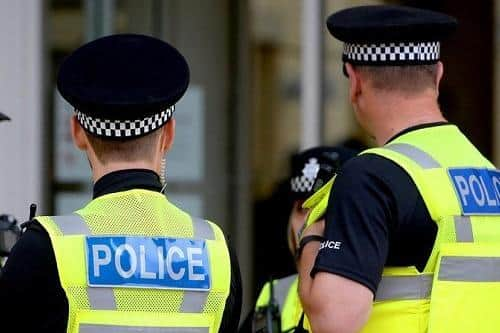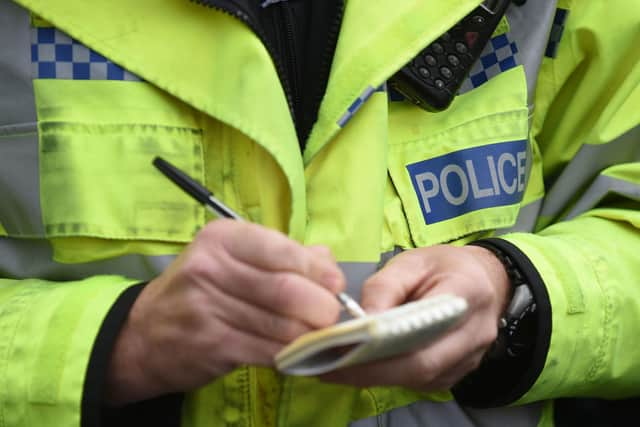Use of stop and search by Bedfordshire Police on the rise - but fewer lead to an arrest
and live on Freeview channel 276
Bedfordshire Police conducted hundreds of more stop and searches last year, figures show, though fewer led to an arrest.
StopWatch UK said declining arrest rates across England and Wales suggest that relations between the police and the public are deteriorating.
Advertisement
Hide AdAdvertisement
Hide AdHome Office data shows officers in Bedfordshire used the controversial powers 4,028 times in the year to March – up from 3,476 the year before.


Despite this rise, the proportion of searches which led to an arrest fell from 10 per cent to 8 per cent over this period.
Across England and Wales, the number of stop and searches rose from 577,000 in 2019-20 to 704,000 in 2020-21.
This means almost 2,000 people were stopped per day on average last year, with figures peaking in mid-May 2020, when there were almost 3,000 searches each day.
Advertisement
Hide AdAdvertisement
Hide AdBut the national arrest rate fell from 13 per cent to 11 per cent – the lowest level since 2012-13.


Data for Greater Manchester Police is excluded from yearly comparisons because the force was unable to provide complete figures for 2019-20.
StopWatch UK said the vast majority of searches cause more problems than they solve.
Habib Kadiri, research and policy manager at the police monitoring organisation, said a fall in arrest rates reflects fears that police-community relations are backsliding.
Advertisement
Hide AdAdvertisement
Hide AdThe figures also show that across England and Wales, black people were significantly more likely to be searched than white people, though slightly less so than the year before.
In Bedfordshire, they were 3.2 times more likely to be stopped, compared to 2.9 in 2019-20.
Mr Kadiri added: "What is exceptional is how racial disparities persisted even during a global pandemic, proving that the police never stopped working tirelessly to overpolice people of colour.
“We simply would not accept this of any other emergency service profession. The police must do better.”
Advertisement
Hide AdAdvertisement
Hide AdAcross the two nations, 479,000 (68 per cent of all stops) were for drugs – the highest proportion since records began in 2006-07.
In Bedfordshire, 76 per cent of stop and searches were for this reason – up from 68 per cent in 2019-20, and also a record high.
Superintendent Ian Taylor, Bedfordshire Police’s lead for stop and search, said: “These figures cover the year 2020/21 and we have put a huge amount of time and resources into training our officers around stop and search over the past six months.
“This includes specific training days looking at the impact stop and search can have on people from diverse backgrounds.
Advertisement
Hide AdAdvertisement
Hide Ad“Our arrest rates are also up this year compared to these figures, while we look to utilise community resolutions where we can to avoid unnecessarily criminalising people for lower level offences.
“A recent review by Her Majesty's Inspectorate of Constabulary and Fire & Rescue Services found that we used reasonable grounds to carry out stop and search on 95 per cent of occasions, up from 81 per cent during the last review in 2018.
“We don’t want to discourage our officers from using stop and search as it has a vital role to play in our fight against drug and knife crime in particular.
“While our levels of disproportionality around stop and search remain among the lowest in the country, we remain committed to improving how we use stop and search and ensuring it is used in a fair and transparent way.
Advertisement
Hide AdAdvertisement
Hide Ad“This includes robust internal as well as independent external scrutiny from members of the community, who can hold us to account around how we are using these powers and ensure all of this feedback is given to the officers involved.”
Dr Laura Garius, policy lead for Release, which comprises experts on drug laws, said black and other ethnic minority individuals are being disproportionately targeted, despite drug use being no higher among these groups than among the white population.
She added: "The declining find and arrest rates are further proof that these powers are over-used, ineffective, and harmful to black and brown communities – in particular, black men – as well as those living in lower-income areas."
The Home Office said police used extra officers and resources to tackle drug crime during the coronavirus lockdown, and also removed almost 16,000 dangerous weapons from our streets.
A spokesman added: “No one should be targeted for stop and search because of their race and there are extensive safeguards in place to prevent this."